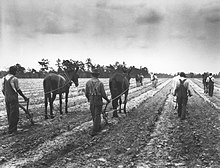


| ||
|---|---|---|
  |
||
|
|
The Cotton-Holiday was a 1931 proposal by Louisiana Governor and US Senator-elect Huey Long to alleviate a surplus of cotton. The holiday would have banned cotton production in 1932, decreasing supply and raising prices. It has been credited as the first suggestion of artificial scarcity as a solution to the Great Depression.
A record 1931 cotton crop of over 15.5 million bales, over two million higher than projected, resulted in a plunge in prices of agricultural commodities.[1] At its lowest since 1905, the price of cotton was less than the cost of production.[2][3] In a telegram to the governors of fourteen cotton-producing states, the Federal Farm Board (FFB) chairman recommended that farmers be forced to plow over every third row of cotton, destroying some 4 million bales of the 1931 crop.[4] The advice was widely criticized.[5]
Unlike other industries, cotton had not experienced massive prosperity in the 1920s, worsening the impact of the Great Depression.[6]
Long proposed that the states mandate a "cotton holiday" in 1932, in which not a single bale of cotton would be produced.[5] Long wired his proposal to the other governors and invited them to discuss the proposal at the New Orleans Cotton Conference.[7] To protect domestic prices, Long further proposed that the holiday be imposed internationally, in which some nations, such as Egypt, expressed interest.[8] The 1931 convention was attended by delegates from every major cotton-producing state.[9] After defeating a countering Texas plan of only 50% reduction, the delegates agreed to codify Long's proposal into law on the caveat that they not come into effect until states producing three-quarters of US cotton passed such laws.[10]
As the proposer, Louisiana unanimously passed the legislation.[11] Conservative Texan governor Ross S. Sterling, whose state was the largest producer of cotton, condemned the law as radical.[12] When the Texas legislature voted against the measure, the holiday movement collapsed.[13] Long alleged that "Texas legislators were bought to kill the cotton-holiday plan like you'd buy a slot machine."[14]
Texas instead passed the Texas Cotton Acreage Control Law, which stated that no more than 30% of cultivated land could be used for cotton. Difficult to enforce, the law was found unconstitutional in 1932.[3] Mississippi and Arkansas passed similar legislation except with escape clauses which set dates for the regulations to expire.[6]
Although traditional politicians would have been ruined by such a defeat, Long became a national figure and cemented his image as a champion of the poor.[15]
Senator Carter Glass of Virginia, one of Long's most adamant opponents, said regarding the Cotton-Holiday, "Contrary... to popular supposition, neither Secretary Wallace of the Agriculture Department, nor the President of the United States should be credited with the original idea of 'scarcity of production' as a cure for the depression. The credit for this peculiar notion should go to Mr. Huey P. Long."[16]